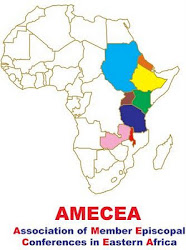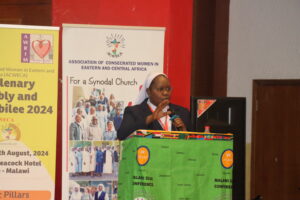AMECEA: What should we know about -‘The Financing for Development Process’

|
Antony is attending the
Third International Conference on Financing for Development (FfD) in Addis Ababa Ethiopia.
The Conference, which
started on 13th and Ended on 16th July 2015, has been held at the highest possible political level, including Heads of State or Government, relevant ministers – ministers for finance, foreign affairs and development cooperation – and other special representatives.
The conference is expected
to result both in an intergovernmentally negotiated and agreed outcome and in summaries of the plenary meetings and other deliberations of the Conference, to be included in the report of the Conference. |
An Abstract from Mr Anthony
Mbandi, AMECEA Justice and Peace and Caritas
Mbandi, AMECEA Justice and Peace and Caritas
In the last week the entire world has been in
the AMECEA Region (Addis Ababa) to discuss the much touted game changer, Financing
for Development outcome document which has been dubbed Addis Ababa
Agenda for Action.
the AMECEA Region (Addis Ababa) to discuss the much touted game changer, Financing
for Development outcome document which has been dubbed Addis Ababa
Agenda for Action.
So what makes this document a big story? The
Financing for Development process commonly referred to as FfD, is a process
that was started to redefine development cooperation.
Financing for Development process commonly referred to as FfD, is a process
that was started to redefine development cooperation.
It was an initiative of the poorer countries
to define a framework by which they would be able to systematically put in
place resources to develop their people and make sure what they were receiving
from the north was fit for purpose.
to define a framework by which they would be able to systematically put in
place resources to develop their people and make sure what they were receiving
from the north was fit for purpose.
The process was adapted by the UN in Monterey
and became so successful that by the second conference that took place in Doha,
it had become an event that no country wanted to be left on board.
and became so successful that by the second conference that took place in Doha,
it had become an event that no country wanted to be left on board.
Doha was even more meaningful because the
international community started seeing the cracks in financial systems that
were causing global problems. It was no longer
“My Country” business.
international community started seeing the cracks in financial systems that
were causing global problems. It was no longer
“My Country” business.
The process had presented itself as the best
place for clear definition of resources to discussed and put on paper and not
only looking at the external funding but also internal government mechanisms
that would allow for in country development.
place for clear definition of resources to discussed and put on paper and not
only looking at the external funding but also internal government mechanisms
that would allow for in country development.
In the current round of Financing for
Development, there has been an attempt to merge this process with the
Sustainable Development Goals process and the Climate Change discussions of
2015 (COP21). Why is this wrong? Someone
may ask. The simple answer is that the
FfD process is much wider than just putting resources in place for SDGs or
Climate Change work. It is a process
that also attempts to define the real value of nations based on what resources
they have locally and how they are being utilized.
Development, there has been an attempt to merge this process with the
Sustainable Development Goals process and the Climate Change discussions of
2015 (COP21). Why is this wrong? Someone
may ask. The simple answer is that the
FfD process is much wider than just putting resources in place for SDGs or
Climate Change work. It is a process
that also attempts to define the real value of nations based on what resources
they have locally and how they are being utilized.
It is a process that attempts to bring forth
the weaknesses of financial systems that have led to the low development in
countries in the global south. On the
other hand SDGs is an agreed development agenda, which then has to find
mechanisms to be financed. On climate change, The Holy Father has clearly
stated that we need to have the ones who have polluted to pay. By trying to incorporate climate financing
onto the FfD process is saying that nations will put in resources by themselves
to finance what other nations have done wrong.
We are bringing individual mistakes to the global arena.
the weaknesses of financial systems that have led to the low development in
countries in the global south. On the
other hand SDGs is an agreed development agenda, which then has to find
mechanisms to be financed. On climate change, The Holy Father has clearly
stated that we need to have the ones who have polluted to pay. By trying to incorporate climate financing
onto the FfD process is saying that nations will put in resources by themselves
to finance what other nations have done wrong.
We are bringing individual mistakes to the global arena.
Looking at the outcome document, we could say
that we have made a step forward.
However, and as we realize, these conferences and negotiations are much
more self-centered than interested in the common good. This means to get 193 countries to agree on
common texts is not always easy but it is attainable with the common good in
focus. Based on the above main areas of
the document, there are some reservations that have come up.
that we have made a step forward.
However, and as we realize, these conferences and negotiations are much
more self-centered than interested in the common good. This means to get 193 countries to agree on
common texts is not always easy but it is attainable with the common good in
focus. Based on the above main areas of
the document, there are some reservations that have come up.
Recalling the call of Pope Francis to deal
with broad skewed financial systems in the globe it is critical that moving
forward we engage with a respective governments of the following issues.
with broad skewed financial systems in the globe it is critical that moving
forward we engage with a respective governments of the following issues.
1. It is good that the Financing for Development
process has been linked in the Sustainable Development Goals process. We however would like to warn that this
conference should not to simplify it to mean looking for funds to finance
Sustainable Development Goals. It is
important to recognize that Financing for Development has one aspect of
financing Sustainable Development Goals but also has an aspect dealing with
financial systems and specifically illicit financial flows, international
trade, debt, skewed taxation systems etc.
There should be clear and measurable commitments to address the systemic
issues that hurt African Countries.
process has been linked in the Sustainable Development Goals process. We however would like to warn that this
conference should not to simplify it to mean looking for funds to finance
Sustainable Development Goals. It is
important to recognize that Financing for Development has one aspect of
financing Sustainable Development Goals but also has an aspect dealing with
financial systems and specifically illicit financial flows, international
trade, debt, skewed taxation systems etc.
There should be clear and measurable commitments to address the systemic
issues that hurt African Countries.
2.
It is a strong proposal that the issue of an
all-inclusive tax body be strengthened which will allow for poor countries to
be involved in not only understanding the taxation systems but also to be able
to ensure they can start making decisions which are in the interests of their
local situations and has potential capacity to raise more resources locally.
OECD remaining as the key institution for defining the taxation systems for the
rest of the world and has so far not helped developing countries achieve better
results.
It is a strong proposal that the issue of an
all-inclusive tax body be strengthened which will allow for poor countries to
be involved in not only understanding the taxation systems but also to be able
to ensure they can start making decisions which are in the interests of their
local situations and has potential capacity to raise more resources locally.
OECD remaining as the key institution for defining the taxation systems for the
rest of the world and has so far not helped developing countries achieve better
results.
3. Private financing for development is welcome
as addition methods for financing development.
However, it is critical to ensure that the Private Sector is brought
under the same internationally agreed mechanisms of transparency accountability
and ensure that they fulfill their tax obligations. Besides, social sectors such as health,
education, water and sanitation cannot be left to the gamble of the private
sector. Private sector cannot replace
the public sector as the key to ensuring development of citizen.
as addition methods for financing development.
However, it is critical to ensure that the Private Sector is brought
under the same internationally agreed mechanisms of transparency accountability
and ensure that they fulfill their tax obligations. Besides, social sectors such as health,
education, water and sanitation cannot be left to the gamble of the private
sector. Private sector cannot replace
the public sector as the key to ensuring development of citizen.
4.
It is very key to have inclusivity in the
processes. There is mention of women in
the document. However, we realize that
in the current document, women are taken as objects of development. We cannot and should not be seen to include
women in our financing for development agenda because they will bring
development. It their basic right to be
included in the process. Another of our concern is the 70% population of
Africa, which is he youth. This document
prepares for the future and the youth are the future. It is critical we place youth centrally in
the FfD process since they are the future.
It is very key to have inclusivity in the
processes. There is mention of women in
the document. However, we realize that
in the current document, women are taken as objects of development. We cannot and should not be seen to include
women in our financing for development agenda because they will bring
development. It their basic right to be
included in the process. Another of our concern is the 70% population of
Africa, which is he youth. This document
prepares for the future and the youth are the future. It is critical we place youth centrally in
the FfD process since they are the future.
In
conclusion, the document will be signed by the heads of states and it is important
for conferences to keep track on the process to ensure that within the
countries the agreed points are articulated to the benefit of the common man.
conclusion, the document will be signed by the heads of states and it is important
for conferences to keep track on the process to ensure that within the
countries the agreed points are articulated to the benefit of the common man.


